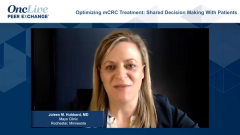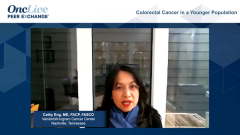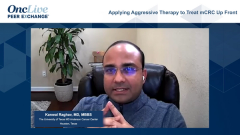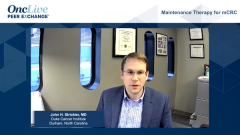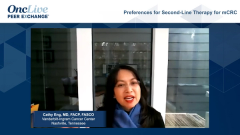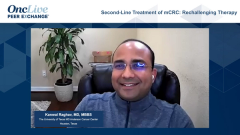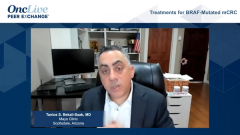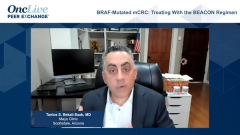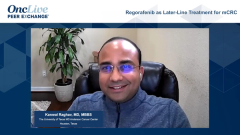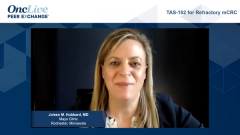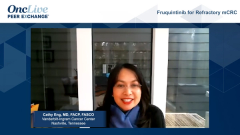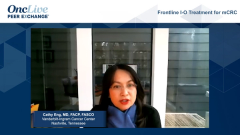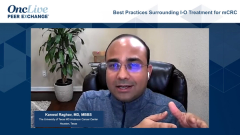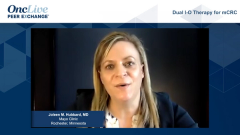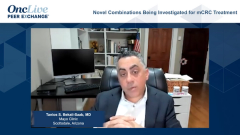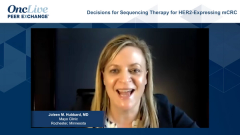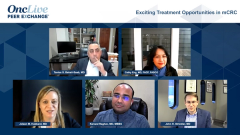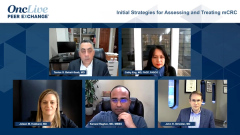
Initial Strategies for Assessing and Treating mCRC
Experts in gastrointestinal oncology highlight their approaches to assessing patients with newly diagnosed metastatic colorectal cancer and explain the variables that factor into first-line treatment decisions.
Episodes in this series

Tanjos S. Bekaii-Saab, MD: Hello, and welcome to this OncLive® Peer Exchange® titled “Personalized Approaches to Treatment of Metastatic Colorectal Cancer.” The past 12 months have been transformative in gastrointestinal oncology. Practice-changing data continue to emerge, particularly surrounding more personalized management of metastatic colorectal cancer. These are exciting times in the treatment of metastatic colorectal cancer. My name is Tony Bekaii-Saab. I’m from the Mayo Clinic in Phoenix, Arizona. Joining me in this discussion are John Strickler from the Duke Cancer Institute in Durham, North Carolina; Kanwal Raghav from The University of Texas MD Anderson Cancer Center in Houston, Texas; Cathy Eng from Vanderbilt-Ingram Cancer Center in Nashville, Tennessee; and Joleen Hubbard from the Mayo Clinic in freezing Rochester, Minnesota.
In today’s discussion, my colleagues and I will discuss recent data from the key clinical trials and implications for how metastatic colorectal cancer should be treated in 2021. Let’s start by discussing your approach to the initial assessment of a patient with newly diagnosed metastatic colorectal cancer. How do you decide on choices of frontline therapy? What factors or characteristics help you decide on treatment?
Kanwal Raghav, MD, MBBS: The first-line chemotherapy for colorectal cancer has evolved over the past few years. Overall new patient tumor characteristics need to be balanced before I make those decisions at least for current management. In totality, molecular profiling and tumor characteristics trump most everything. We try to do next-generation sequencing and molecular profiling up front for our patients with colorectal cancer. Then there are these buckets that you recognize, and that’s how treatment follows. The most important thing is…testing where immunotherapy becomes a good first-line option. Beyond that group, if you have a…population, then your treatments are restricted to cytotoxics and anti-VEGF agents: Bevacizumab–FOLFOX [5-fluorouracil, leucovorin, oxaliplatin], bevacizumab–FOLFIRI [5-fluorouracil, leucovorin, irinotecan hydrochloride], and bevacizumab–FOLFOXIRI [5-fluorouracil, leucovorin, oxaliplatin, irinotecan] are 3 good options. That depends on other patient characteristics. I have become a big fan of using triplet cytotoxics after the positive data from TRIBE and TRIBE2 studies, but only for patients who are robust enough...
The choice between FOLFOX [5-fluorouracil, leucovorin, oxaliplatin] and FOLFIRI [5-fluorouracil, leucovorin, irinotecan hydrochloride] is mostly based on discussions with patients about hair loss, toxicities such as neuropathy, and certain comorbidities that could restrict the use of 1 agent over the other. Then comes the question of anti-EGFR drugs, which are the KRAS wild-type group. In this group, we like to identify 2 separate groups, the BRAF and the…separately because those preferably should move toward clinical trials as early as possible. But for the remaining ones, if you’re left-sided, we try to make anti-EGFR up front if possible. These things are also dependent on how quickly we need to start treatment and how quickly we’re going to get results. If you’re a right-sided tumor, then we go more along the lines of…patients.
Tanjos S. Bekaii-Saab, MD: You said you’re moving more toward 3-drug regimens. How do you decide on a left-sided patient who has all the good molecular genetic markers for a triplet vs an EGFR inhibitor?
Kanwal Raghav, MD, MBBS: On the question of a triplet cytotoxic regimen like FOLFOXIRI [5-fluorouracil, leucovorin, oxaliplatin, irinotecan], the favorable factor is usually bevacizumab. FOLFOXIRI [5-fluorouracil, leucovorin, oxaliplatin, irinotecan], even though there are some data out for its feasibility, becomes extremely toxic. If you have appropriately selected your population for an anti-EGFR, if they are distal left-sided, HER2 negative, BRAF negative, then the response rates, with Cytoxan in combination with a double agent should be big enough not to warrant the extra toxicity of FOLFOXIRI [5-fluorouracil, leucovorin, oxaliplatin, irinotecan].
FOLFOXIRI [5-fluorouracil, leucovorin, oxaliplatin, irinotecan] is best in really young individuals, possibly BRAF-mutant patients, or those who have an aggressive disease like peritoneal carcinomatosis. That’s where I generally use it in combination with an anti-VEGF like bevacizumab.
Cathy Eng, MD, FACP, FASCO: Regarding the FOLFOXIRI [5-fluorouracil, leucovorin, oxaliplatin, irinotecan] combination with anti-EGFR therapy, the VOLFI trial was a small, phase 2 study, less than 100 patients. Some individuals like to consider utilizing it, but they did have 25% grade 3 or 4 diarrhea. That’s important to keep in mind. I agree with Kanwal on this. There’s a very select population that we can potentially use that for. I also tend to use bevacizumab in that setting much more with anti-EGFR in a triplet.
Tanjos S. Bekaii-Saab, MD: Would you ever use FOLFOXIRI [5-fluorouracil, leucovorin, oxaliplatin, irinotecan] and an EGFR inhibitor? Is there any setting where you think this is a reasonable option?
Joleen M. Hubbard, MD: Given the high response rates, if you have a young patient with good performance status, and you need a Hail Mary to try to convert them from unresectable to resectable, that might be 1 situation for someone with a left-sided tumor where I’d consider using that. Otherwise, based on the toxicities and the lack of phase 3 data, I’m not using it routinely in a first-line setting.
John H. Strickler, MD: A triplet FOLFOXIRI [5-fluorouracil, leucovorin, oxaliplatin, irinotecan] is appropriate in some cases of robust, fit patients who are wanting to be aggressive. The preferred partner of TRIBE and TRIBE2 studies is bevacizumab, but in most cases, that regimen is a bit much for the average person coming in, so we need to be thoughtful about who we’re giving that to and just make sure that we’re matching the right treatments to the right person.
Transcript Edited for Clarity


